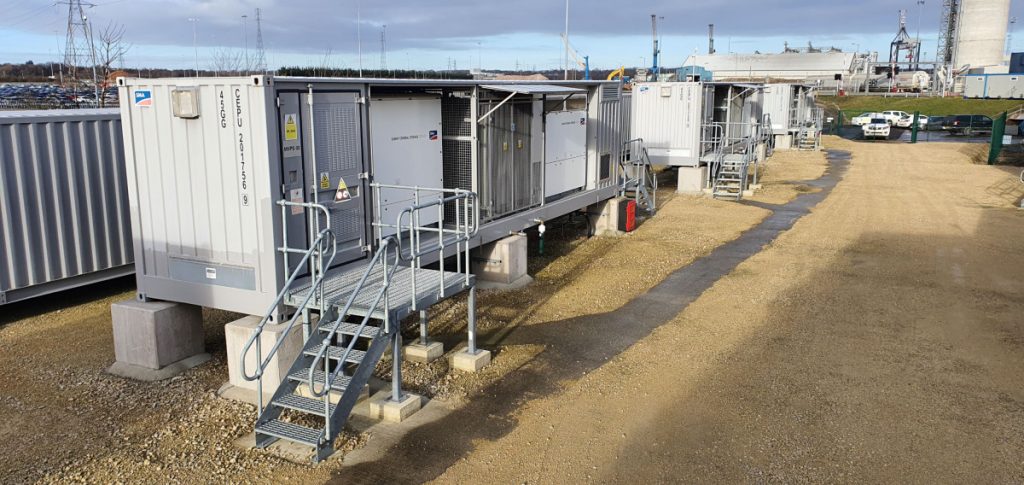The UK is taking great strides towards achieving net zero carbon emissions. There has been a remarkable surge in renewable energy generation, notably wind power, accounting for 29.4% of power generation last year. Specifically, wind power reached new heights in December 2023, breaking a record of 21.8GW. Also, solar energy broke a new record of 10.971GW.
Despite this progress, more than increased renewable energy generation alone is needed. A robust energy infrastructure is required to effectively harness this renewable energy, using it when it’s needed most.
In this article, we’ll explore Battery Energy Storage Systems (BESS) and the role they play in overcoming grid instability and the wastage of clean energy.

Understanding the Challenges of Renewable Integrations
Efficiently integrating renewable energy into the power grid faces many challenges that, if left unchecked, can undermine the full potential of clean energy. Several implications can lead to network constraints, including:
- Transmission Congestion – In specific areas where generation from renewables is high, the existing transmission lines may not have the capacity to handle the excess power to areas of high demand. Furthermore, it can lead to an imbalance between the supply and demand of clean energy.
- Frequency Variability – Renewables, such as wind farms and solar, exhibit natural variability due to intermittent weather conditions. Without a reinforced grid and Battery Energy Storage Systems, managing these fluctuations in frequency becomes difficult and can increase the risk of equipment strain and operational downtime.
- Inefficient Load Balancing – When the power grid can’t balance power generation with demand efficiently, it can lead to challenges in maintaining a dependable energy supply. To compensate for ineffective load balancing, grid operators may have to rely on more traditional energy supplies to meet this demand. This contradicts the objective of shifting to a primarily renewable energy infrastructure.
As the UK accelerates its adoption of renewables, surpassing the pace of energy infrastructure upgrades, tackling these challenges becomes crucial to avoid curtailment.
Instead of incurring heavy costs to waste clean power generation, we also can store it to improve the viability of our projects.
Optimising Sustainability and Minimising Curtailment via BESS
Battery Energy Storage Systems ensure a dependable and resilient energy infrastructure that can support the ever-increasing adoption of renewables and decrease our reliance on conventional power sources. Here are some of the key factors in which BESS can minimise curtailment and contribute to a sustainable energy landscape:
- Grid balancing and Stability – via sophisticated load management capabilities and peak shaving, battery storage systems enable grid operators to strategically distribute energy from renewables. The stored energy can be deployed precisely where and when needed most, which fosters more efficient use of resources and minimises waste.
- Reduced Reliance on Fossil Fuels – Leveraging BESS enables the smoother integration of clean energy, helping the UK further reduce its dependence on fossil fuels and the heavy costs incurred by curtailment.
- Contributions to Electrification – Energy storage also supports the broader goal of electrification across various sectors, such as electric vehicle (EV) adoption and enhancing offshore operations.
- Increased Energy Security – Via swift response to unforeseen power outages, islanding capabilities and decentralised energy distribution, utility-scale storage can support microgrids and significantly enhance the UK’s energy security, acting as a buffer against supply disruptions.
How EPS Contributes to Net Zero with Battery Storage
As technology evolves, so does the potential of battery energy storage in mitigating the effects of climate change and driving sustainability in the energy sector. Ongoing research and development in advanced battery technologies promises further enhancements in efficiency, capacity, and cost-effectiveness.
The continued adoption of BESS will help in relieving constrained networks, preventing grid bottlenecks, and ensuring a smooth flow of clean energy. At Engineering Power Solutions (EPS), we are contributing to the UK’s energy targets offering innovative BESS consultancy and design solutions. Our chartered electrical engineering consultants provide a range of power system studies, detailed designs, and expert advice in grid connection management.
To empower your energy transition, get in touch with our specialists today.










